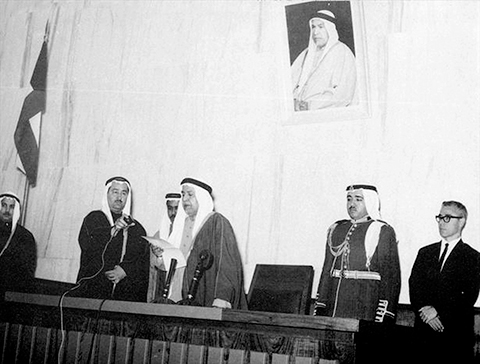 KUWAIT: This January 20, 1962 picture shows then Amir of Kuwait Sheikh
KUWAIT: This January 20, 1962 picture shows then Amir of Kuwait SheikhAbdullah Al-Salem Al-Sabah delivering a speech during the inaugural session of the Constituent Assembly of Kuwait. —Photo courtesy of Kuwait-history.net
KUWAIT: Amid a palpable democratic atmosphere with parliamentary elections less than a month away on November 26, Kuwait's National Assembly has been the nation's legislative authority since independence. On June 19, 1961, Kuwait became an independent state by virtue of an agreement signed with Britain by Kuwait's seventh ruler Sheikh Mubarak Al-Sabah. After two months had elapsed, the late Sheikh Abdullah Al-Salem issued an Amiri decree on August 26, 1961, where he appointed an 11-member committee to work on forming the country's first National Assembly.
Moreover, in September 1961, a law calling for Kuwait's first parliamentary elections came into effect, as Kuwait was subsequently divided into 10 constituencies with each represented by two candidates in parliament. The law also stipulated that all MPs should at least be 30 years of age and should be fluent in spoken and written Arabic.
In a political milestone, elections were held on December 30, 1961 to determine the nation's inaugural national assembly, or 'constituent assembly', a 20-member strong committee that would go on to hold its first session, with a speech given by Sheikh Abdullah Al-Salem Al-Sabah, where he espoused the merits of true democracy.
Furthermore, in its first session, Abdullatif Al-Ghanem was elected assembly speaker. From there, in March 1962, parliament formed a five-member committee in Yaqoub Al-Humaithi, Humoud Al-Khaled, Abdullatif Al-Ghanem, late Amir Sheikh Saad Al-Abdullah Al-Sabah and Saud Al-Abdulrazzaq.
Upon presenting Sheikh Abdullah Al-Salem with the nation's official constitution, Ghanem underscored the enormity of the moment, saying, "It is an honor for all of us on this historic day to present the country's constitution, which epitomizes genuine democratic principles." In response, Sheikh Abdullah Al-Salem described the occasion as a significant milestone in the fledgling nation's history.
On January 15, 1963, the inaugural assembly held its last session, where it noted that democracy has come full circle with the nation's first constitution. In a speech, Sheikh Jaber Al-Ahmad proclaimed that Kuwait has ushered in a new era of democracy and political stability.
A week later, Kuwait's first national assembly paved the way for elections to determine the country's first parliament. The newly-formed constitution contained 183 clauses that deal with governance, authority, social values and general obligations. - KUNA










